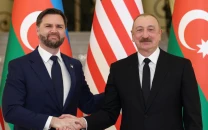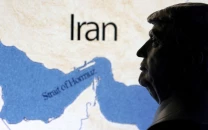Islamophobia like 1930s anti-Semitism: Islamic forum head
"We are getting held hostage by the marginal groups on the European side and on the Muslim side," says OIC chief.

Islamophobia like 1930s anti-Semitism: Islamic forum head
Ekmeleddin Ihsanoglu, secretary general of the Organisation of the Islamic Conference (OIC), said xenophobia directed at Muslim immigrants was taking hold, especially in Europe.
Vote-seeking politicians were advancing extremist groups behind the anti-Muslim sentiment.
"This issue has become a political agenda item," the Turkish head of the 58-member OIC told AFP in an interview, while stressing that Islam was also a European religion.
"What worries me is that political authorities or political parties, instead of stopping this, or fighting this, some of them are using this for their political ends, to gain more popular support in elections," he said.
"I'm afraid that we are going through a process like the beginning of the '30s of the last century, when an anti-Semitic agenda became politically a big issue (together with) the rise of fascism and Naziism.... I think now we are in the first stages of such a thing."
A "pandemic of Islam vilification" is rising steadily, he warned, as documented by the OIC's newly-established office to monitor Islamophobia around the globe.
Ihsanoglu pointed to the protests in the United States against the "Ground Zero" Islamic centre in New York City, to the anti-burqa movement in Europe, to physical attacks on Muslims on both sides of the Atlantic.
The problem which most concerned him was the institutionalisation of anti-Muslim sentiment in Europe, citing Switzerland's ban on minarets atop mosques and the movement to ban Muslim women's "burqa" full-face covers.
"This burqa business is really a sad story, it's only a few people who are doing this (wearing the burqa)... It's just part of old habits of certain tribes in certain countries, it's not at all to do with Islam."
Yet countries like France, Spain and Holland were reacting with legislation.
The OIC chief from secular Turkey predicted that time would take care of problem issues such as the burqa, as Muslims from less-developed cultures reach "a modern way of life."
But focusing on assimilation was the wrong approach.
"Why assimilation? If Europe and the West are advocating the rights of minorities all over the world, why then when it comes to Europe do we speak about assimilation? Again, that shows the double standard."
"Europe has to understand the reality of Islam today, and the reality that Islam is not an alien religion of Europe. Islam is a European religion, and Europe has to come to terms with Islam."
Mustachioed, with the erudite bearing of a scholarly British diplomat, Ihsanoglu is an expert in Islamic cultural history and the history of science, with a long career as a professor and department head at Istanbul University.
Born in Cairo in 1943, he has led the Jeddah-based OIC since 2005 through a period when the Islamic world has been mired in cultural wars with itself and with the West.
Ihsanoglu spoke to AFP before the massacre of more than 50 Christians by al Qaeda members in a Baghdad church on October 31. In an official statement, he has vehemently condemned the killings as a "criminal and terrorist act."
While such violent attacks feed anti-Islamic hate, he argued Islamophobia arised separately from them. "I think we have to keep extremism out of this discussion, which is a different topic."
The real issue, he insisted, was how anti-Muslim sentiment was included in high-level policy debate in some European countries.
In the United States, he said, Islamophobia was not as virulent. One reason was that Muslim immigrants to the US were better-educated and fitted in more easily.
A key difference was how Washington had consistently resisted admitting anti-Islamic emotions into public policy.
"For instance, this marginal pastor who wanted to burn Korans. The (US) government took responsibility and talked to him and convinced him not to do that."
While he advocates cultural compromise, Ihsanoglu draws the line at certain things, like the Danish cartoons of Prophet Mohammed that sparked outrage among Muslims worldwide after they first appeared in 2005.
"Asking us to accept the cartoons is asking to accept insults as a norm. How can people ask us to accept the cartoons? This is indecent," he said, adding a warning that radicals on both sides should not be allowed to set the agenda.
"We are getting held hostage by the marginal groups on the European side and on the Muslim side," he said.



















COMMENTS
Comments are moderated and generally will be posted if they are on-topic and not abusive.
For more information, please see our Comments FAQ